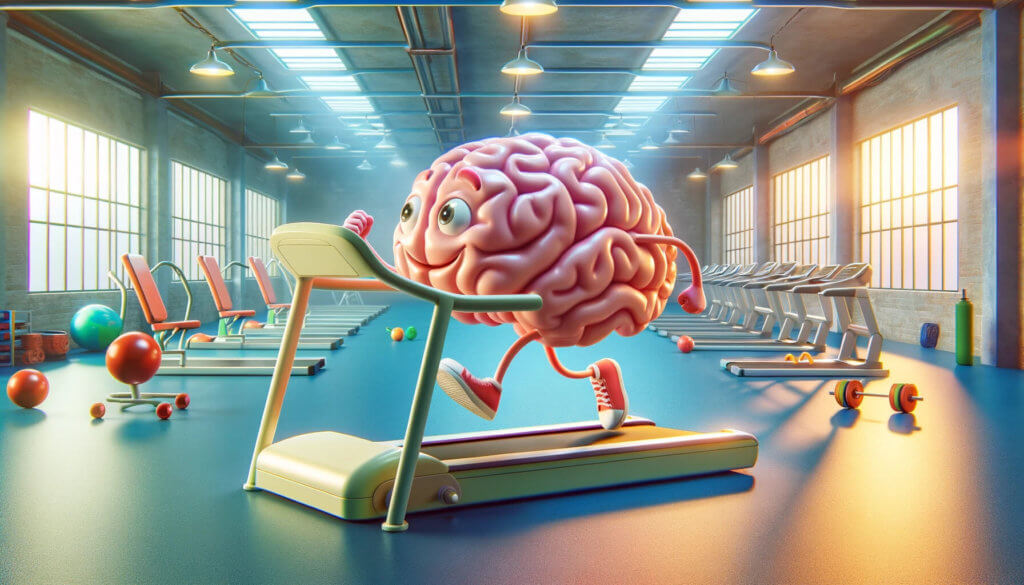Imagine a day when you feel deeply connected to the flow of life. It’s not necessarily a day without challenges, but one where you navigate through them with a sense of purpose and resilience.
This kind of flourishing isn’t about avoiding the tough moments but thriving amidst them, embracing the full spectrum of the human experience. To reach this state, one that the ancient Greeks called Eudaimonia and that I call holistic fitness, it’s essential to nurture not just one aspect of ourselves but rather all facets: our minds, bodies, relationships, and spiritual parts.
The concept of being mental, physical, social, and spiritual “fit” isn’t about achieving perfection or eliminating hardship. Instead, it’s about cultivating the strength and flexibility to embrace life fully, with all its ups and downs.
Let’s explore why we’re using the term “fitness” to describe this holistic approach to well-being.
Why "Fitness"?
“Fitness” often conjures images of physical health and activity like gyms and running, but let’s broaden our view a bit more. Think of fitness as readiness and resilience across all of life’s area’s: the mental, physical, social, and spiritual aspects.
Universal Application:
True fitness transcends physical capabilities. It embodies our readiness to face life’s complexities with openness and flexibility. Whether it’s adapting to unexpected changes, nurturing relationships, or finding meaning in adversity, fitness in its broadest sense prepares us for the dynamic nature of life.
Put simply: It’s our ability to respond effectively by always training, learning and growing in all areas.
The journey towards mental, social, and spiritual fitness, much like physical, is ongoing and active and never truly achieved. It’s about enhancing our capacity to accept, adapt, take action and grow in our lives.
Embracing a holistic view of fitness empowers us to engage with life proactively. We can make conscious choices that align with our values and goals, whether that’s through physical activity, cultivating meaningful connections, introspection, or engaging with the world around us.
This proactive stance helps us navigate life’s challenges with a greater ease and contributes to our overall sense of flourishing.
In adopting this broadened perspective of fitness, we recognize the dynamic interplay between various aspects of our well-being. We can prepare ourselves not just to endure life but to embrace and enrich our experience of it.

Mental Fitness
What It Means: At its core, mental fitness is about our ability to be psychologically flexible and anti fragile. This means being open and adaptive to our internal experiences—like thoughts and emotions—while also responding effectively to the external world.
It’s about embracing life as it comes, navigating challenges with resilience and anti-fragility, and moving toward what matters most to us, even when it’s tough.
The Role of Psychological Flexibility: Psychological flexibility is fundamental to mental fitness. It involves holding our inner experiences lightly so they don’t unduly influence our actions, and consciously choosing behaviors that align with our values, regardless of what thoughts and feelings arise. This ability enables us to face life’s uncertainties and adversities with a sense of confidence and openness, rather than avoidance or rigidity.
Why It Matters:
Research shows that psychological flexibility is linked to improved mental health outcomes, including reduced stress, anxiety, and depression, and enhanced overall well-being. It allows us to adapt to changing circumstances, make healthier choices, and pursue a meaningful, values-driven life. Cultivating psychological flexibility helps us not just survive but thrive, even in the face of life’s inevitable challenges.
How to Cultivate It:
- Mindfulness Practices: Engage in mindfulness to become more aware and accepting of your present-moment experiences without judgment. Practices like meditation or simply pausing to breathe deeply can help you stay centered and responsive rather than reactive.
- Values Clarification: Identify what truly matters to you—your core values—and let them guide your actions. Making decisions based on your values, rather than immediate impulses or societal expectations, enhances your sense of purpose and direction.
- Acceptance Techniques: Learn to accept your thoughts and feelings without trying to change them. Acknowledging that it’s okay to have uncomfortable feelings and thoughts can reduce their impact and free you up to act in ways that align with your values, rather than Struggling trying to change the content of thoughts or feelings.
- Committed Action: Take steps towards your goals, even when it’s difficult, by committing to actions that move you in the direction of your values. This might involve setting small, achievable goals and gradually building on them.
By focusing on psychological flexibility, we redefine mental fitness as the capacity to live a full, vibrant life, enriched by our values and empowered to face whatever comes our way with resilience and openness.
This approach to mental fitness not only enhances our personal well-being but also strengthens our relationships and our ability to contribute meaningfully to our communities.

Physical Fitness
What It Means: Physical fitness is not solely about achieving peak performance or conforming to specific beauty standards. It’s about caring for our bodies in a way that supports our overall well-being, enabling us to engage fully with the world around us. It’s about listening to our bodies and responding with kindness, whether that means moving, resting, or nourishing ourselves with good, healthy food.
The Role of Movement:
Incorporating movement into our lives means recognizing exercise as a form of self-care rather than a punishment or obligation. It’s about finding joy in movement and tuning into how our bodies feel, what they need, and how they respond to different activities.
The Role of Good Food:
Nutrition should take a key role in our physical fitness in addition to movement. Eating well with food that sustains and improves our well-being begins with making the right choices and forming good habits. And in the confusion of information overload of what diet to take or what foods to eat, a simple rule of thumb is to simply eat food that has had as little processing as possible and contributes to a good variety of nutrients.
Why It Matters: It’s no secret that there is a connection between physical activity and good nutrition- and improved mental health, including reductions in anxiety, depression, and stress. Physical fitness also enhances cognitive function and can significantly impact our sense of vitality and energy in daily life.
How to Cultivate It:
- Choose activities that you enjoy and that fit into your life naturally. This could range from walking or cycling to more structured workouts or team sports, depending on what brings you joy and fits your lifestyle.
- Listen to your body’s signals. Rest when you need to rest, eat when you need to eat, and move in ways that feel good. This self-attunement is crucial for sustainable physical fitness.
- Integrate movement into your routine in small, manageable ways. Consider how you can incorporate more activity into your daily life, such as taking the stairs instead of the elevator or doing stretching exercises during breaks.
- Aim for good nutrition whenever possible but also don’t beat yourself up when you slip up. It’s about forming sustainable habits so start slowly and with easy to achieve goals, like one less sugar in coffees or one less desert per week and build up from there.
Physical fitness, approached with an attitude of being present and engaged, in addition to self-compassion, becomes an integral part of living a balanced and fulfilling life. It’s not about pushing ourselves to the limit or never slipping up in our nutrition but rather nurturing our bodies in a way that supports our mental and spiritual fitness as well in a way that’s sustainable.

Social Fitness
What It Means: Social fitness is not just about having social interactions; it’s about cultivating deep, meaningful connections that enrich our lives.
It involves building relationships based on mutual respect, understanding, and shared values. This dimension of fitness also touches on our ability to communicate effectively, empathize with others, and feel a part of a community.
The Role of Connection:
Humans are inherently social beings, and our well-being is deeply tied to the quality of our relationships. Social fitness emphasizes the importance of actively engaging in relationships that provide support, joy, and a sense of belonging. It’s about being present with others, listening deeply, and sharing ourselves authentically.
Why It Matters:
Strong social connections are linked to numerous health benefits, including lower rates of anxiety and depression, higher self-esteem, greater empathy, and even a longer lifespan. The strength of our social bonds significantly impacts our mental and physical health.
Its importance can be seen in this way- the quality of the world we live in is determined by the quality of our relationships.
How to Cultivate It:
- Make time for relationships. Prioritize spending quality time with family and friends, and be fully present during these interactions.
- Engage in community activities. Whether it’s volunteering, joining a club, or participating in a local event, being part of a community can foster a sense of belonging and contribute to your social well-being.
- Practice active listening and open communication. Show genuine interest in others’ experiences and feelings, and express your own thoughts and emotions openly and respectfully. Be vulnerable to act as a model for others to follow.
- Cultivate empathy. Try to see situations from others’ perspectives, fostering a deeper understanding and connection.
Social fitness is about nurturing the connections that make life rich and meaningful. By investing in our relationships and engaging authentically with those around us, we strengthen our social fabric and support our overall well-being.

Spiritual Fitness
What It Means: Spiritual fitness is not necessarily about religion or specific spiritual practices; it’s about cultivating a sense of purpose, meaning, and connection to something greater than ourselves. This could involve exploring our values, engaging with nature, art, or community, and seeking experiences that move us beyond the mundane aspects of daily life.
For those who do have a religious connection, this often provides a good foundation for all areas.
The Role of Meaning and Purpose: At its core, spiritual fitness is about understanding what truly matters to us. It’s about aligning our actions with our deeper values and seeking out experiences that bring a sense of fulfillment and connection. Whether through meditation, nature walks, art, or service to others, it’s the pursuit of what gives our lives a sense of depth and purpose.
Why It Matters: A strong sense of purpose and meaning in life is associated with better mental health, lower stress levels, and even longer lifespan. People who feel connected to a larger purpose tend to have better coping skills and a more positive outlook on life.
How to Cultivate It:
- Reflect on your values. What is most important to you? Spend some time thinking about your core values and how you can live in alignment with them. Also, living in alignment with virtues can be beneficial In keeping yourself grounded and on a good path.
- Seek out meaningful experiences. This could be through nature, art, volunteer work, or spiritual practices. Find what uplifts and fulfills you. Or even better, cultivate a state of wonder!
- Practice gratitude. Regularly reflecting on what you’re thankful for can enhance your sense of connection to the world and the people in it.
- Connect with others on a deeper level. Engage in conversations and activities that explore meaningful topics, enhancing your sense of community and shared humanity.
Spiritual fitness nurtures the part of us that seeks connection, meaning, and a sense of belonging to the larger web of life. By attending to our spiritual well-being, we enrich our lives with purpose and depth, contributing to our overall sense of flourishing.

The Interconnectedness of All Four Areas
While we’ve explored mental, physical, social, and spiritual fitness as distinct categories, it’s essential to recognize how deeply interconnected they are. Improvements in one area can enhance our well-being in others, reflecting the holistic nature of human health.
For instance, engaging in physical activity (Physical Fitness) not only benefits our body but can also improve our mood and reduce stress (Mental Fitness).
Similarly, nurturing deep, meaningful relationships (Social Fitness) can provide a sense of belonging and purpose (Spiritual Fitness), enriching our lives on multiple levels.
And underpinning them all is our mental fitness- that ability to wade through our minds chatter and choose to engage with life rather than get all caught up in your thoughts. Mental fitness is required to even recognize when you are lacking in one area of well-being and what you can do about it- it is the basis for all the other pillars of fitness.
Conclusion
In our quest for a flourishing life, it’s clear that focusing on mental, physical, social, and spiritual fitness in harmony can pave the path to true well-being.
By understanding and embracing the complexity of our nature, we can move towards a more balanced and enriched life. This journey isn’t about perfection or eliminating challenges but about cultivating resilience, connection, purpose, and joy amidst the full spectrum of human experience.
Ask yourself, what small steps can you take today towards nurturing your well-being in these areas?
Your journey towards a balanced and fulfilling life is unique to you, and every step forward is a step towards flourishing, that state of Eudaimonia.
Want to start getting holistically fit? click the button down below to schedule your free discovery call to find out more!





